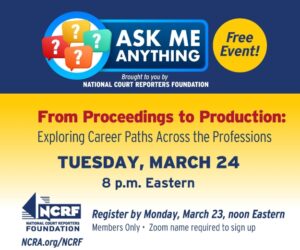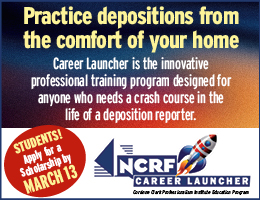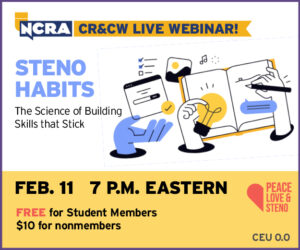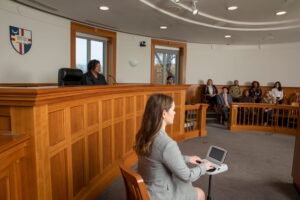By Cindi Lynch
For more than 35 years, I’ve taught court reporters, captioners, instructors, and students how to take full advantage of their CAT software to produce cleaner, more accurate translation and output quality transcripts with less effort. Throughout that time, I’ve learned a lot about every aspect of the work that goes into creating a record … all except for the actual writing.
I know every machine Stenograph has ever made inside and out, and I know enough theory that I can position my fingers on the keys and write well enough to demonstrate various CAT software features. But I cannot do what my students do: Write at the speed that speakers speak.
So in August of 2024, at the age of 61, I became an online student at Clark State/Stark State College. Today I’m in speedbuilding, currently at 80 wpm.
Why? First and foremost, it makes me a better teacher. It’s one thing to listen to stories and be aware of the required hours of practice and challenges of gaining speed and endurance. But of course, it’s entirely different to experience the process firsthand. Secondly, it’s impossible to be in and around this profession for as long as I have and not have a passion for it.
I’m a second-generation Stenograph employee. My mom worked for Stenograph for many years. Through her, I first learned steno theory more than 50 years ago, before there was such a thing as long vowels. Like everyone who has ever looked at a writer and watched a reporter and been amazed that they can do what they do, I’m delighted and excited to finally have the opportunity to explore this path and add this skill to my toolkit.
At my age – I’m 62 now – the experience of going to school is somewhat different from that of other court reporting students. I have a few advantages; I already know a lot more about the realities of the business of court reporting. I know the rules of grammar and punctuation. I also won’t have to spend any time learning how to use my CAT software.
However, my fellow students probably have a lot less joint stiffness, and I imagine they’re not quite as sore as I am after practice. Hand function deteriorates, especially after the age of 65, so there’s the pressure of knowing that if I don’t progress rapidly and develop a strong level of skill soon, I probably won’t have much opportunity to make use of the ability!
But my fellow students and I also have a great deal in common. We all face the challenge of manufacturing enough hours in the day to practice on top of our regular work, taking care of family and home, and the rest of the regular obstacles that life throws at us.
Regardless of how far I’m able to take my skill development, I believe this pursuit is well worth my time and effort. Of course, like every student, I am regularly frustrated by my brain’s determination to interfere in my learning process and to second-guess what my fingers already know they should do when my ears hear each word. I’m proud of what I’ve learned and accomplished thus far and look forward to seeing how far I can go!
Cindi Lynch is Stenograph’s Training Program Manager and a student at Clark State/Stark State College. She can be reached at clynch@stenograph.com.









